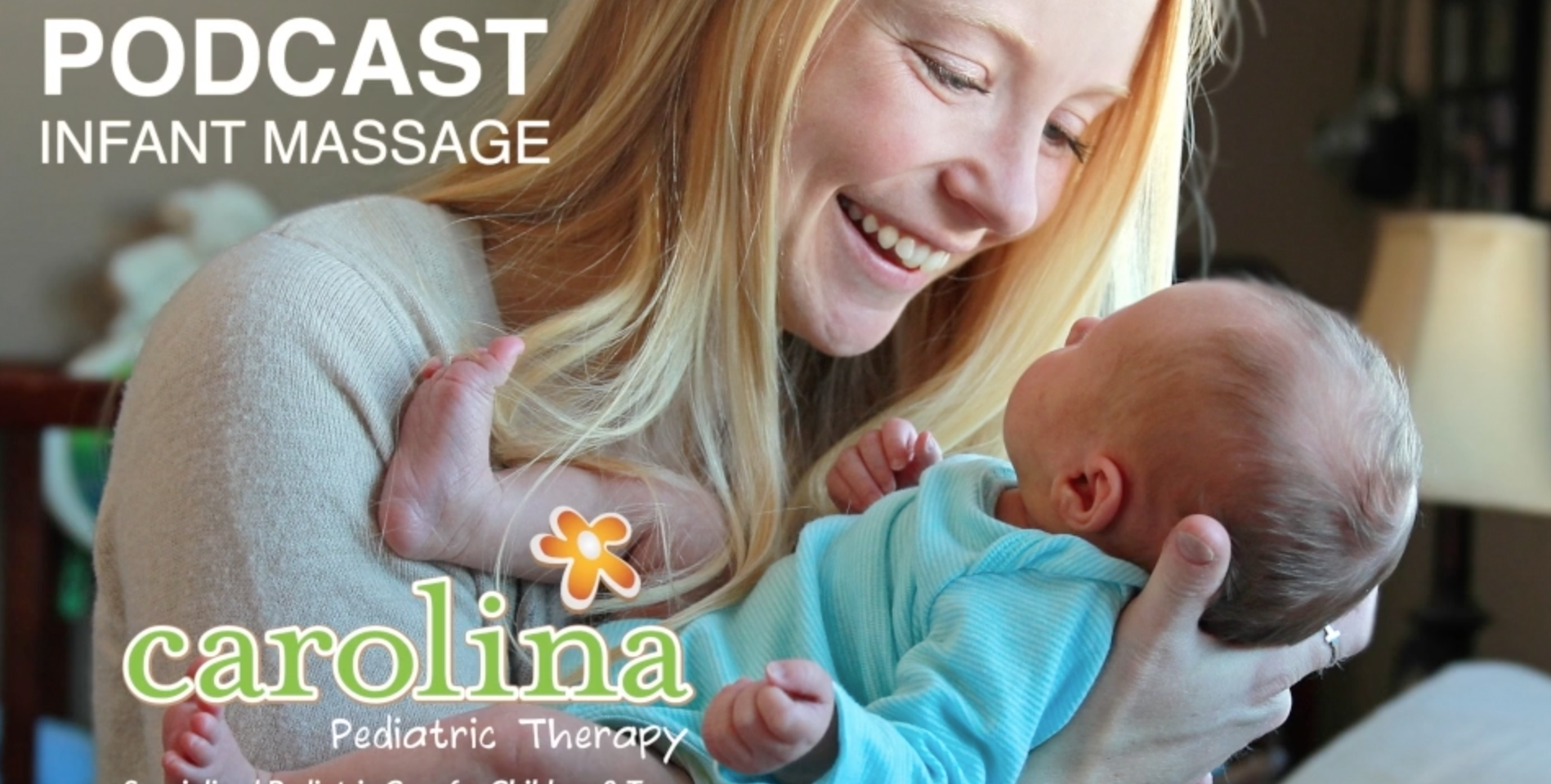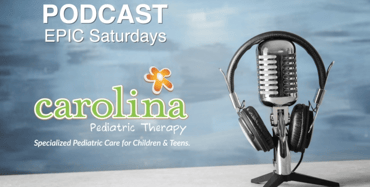Infant Massage, a Summer McMurry Podcast
Join our discussion where we discuss infant massage and the benefits it offers to your baby with Summer McMurry’s PODCAST with guest Jennifer Basch, doctor of Pediatric Physical Therapy. (Listen on Apple iTunes & Google Play).
Podcast Transcript
Summer McMurry:
This is Summer McMurry. I’m the founder and CEO of Carolina Pediatric Therapy and I’m here with Jen [Bausch 00:00:06]. She’s Doctor of Physical Therapy here at Carolina Pediatric Therapy. She is here to talk to me today about infant massage. This new program that we’re doing is the infant massage classes here at Carolina Ped, so good morning Jen.
Jen Bausch:
Good morning.
Summer McMurry:
Thanks for joining me.
Jen Bausch:
Absolutely.
Summer McMurry:
Okay. So we want to let our listeners know a little bit more about this infant massage class. We just started it up. First tell me where our certification comes from with infant massage.
Jen Bausch:
Sure. It’s through Infant Massage USA, and it’s a really great organization because all of the techniques that we’re using are evidence based, so there’s a ton of research that has been going into infant massage based on how an infant’s brain develops and that important bond between an infant and a parent.
Jen Bausch:
It’s a four day training course, and then though that training as well I have to get so many hours of practice and do a written test, so it is a pretty extensive certification process, but definitely worth it to make sure that I know all the skills, in and out, to be ready to teach to families.
Summer McMurry:
Great. Great. We’ve done our trial class already, so tell me a little bit about the age group of infant that this is for.
Jen Bausch:
Sure. Really it can start infants right after birth. They might not tolerate it as much as some older infants. Three months, around that age is kind of the perfect time to really start that full infant massage routine. All the way up to a year we can teach the course.
Jen Bausch:
One of the cool things about the course too is that that last class we talk about how to take some of these skills through and to use with a growing child, so even as your child ages into toddler years and elementary age, we can still incorporate some of these massage techniques.
Summer McMurry:
Awesome. So the parent really is going to walk away with some tools that they can use way after infanthood?
Jen Bausch:
Yes. Absolutely.
Summer McMurry:
Awesome. Okay. That’s great. Then the other thing I know families will want to know about is the benefit of this, because not a lot of people have heard about massaging your infant. I mean grownups go to get massages a lot, but … So talk about the benefits of infant massage.
Jen Bausch:
Sure. Yeah. There are really four main benefits to think about with infant massage. That first one is relaxation of course, so that is probably the first thing that you think about when you do hear massages. That would be why you or I would get one, is just to help us relax and get some stress relief. What they found with infants that receive a massage, even after just a few classes they observe less stress signs in infants, so they’re really finding that it’s helping them regulate their behavioral state, which is great, because that’s when infants learn best, and that’s kind of their job.
Jen Bausch:
When they’re first born they’re absorbing so much information and developing, that we really want them in that optimal state for learning, and with that relaxation also includes better sleep.
Summer McMurry:
Parents love that.
Jen Bausch:
Yes. Absolutely. So not just better sleep right after that massage, but the quality of sleep over time, so less time waking up at night for feeding, more time in that deep REM sleep, again to help their brain absorb all those memories that they’re forming and, again, develop optimally.
Summer McMurry:
Right. Then happy baby, good sleeping baby, good sleeping parents.
Jen Bausch:
Absolutely.
Summer McMurry:
Okay. Then what’s the second benefit you talked about?
Jen Bausch:
That second really important benefit too is that infant bonding. There’s a really important relationship that forms between an infant and a parent, and it is so critical that the infant knows that they are safe and that they are cared for. There’s so much research coming out now about how infants need that sense of security in order to develop that mature emotional state.
Jen Bausch:
We really want our infants well-adjusted, again so that they’re not stressed about all these other things and they can really just think about learning and developing. So with a parent, by providing that nice touch, using their soothing voice, that skin contact, is really what our babies are craving.
Summer McMurry:
That’s really great. You wrote something … I read about the foster parent even being able to benefit from this, so tell me more about that.
Jen Bausch:
That’s right. We used to really think that there was this critical period for that attachment period to happen. We really want that skin-to-skin contact right after a baby is born, all of that great stuff, but some families don’t have that opportunity. You think about parents that are adopting children or fostering children.
Jen Bausch:
What we found is that even up to that first year of life, as long as that child is having somebody in their life where they feel safe and comforted they can still get that same level of attachment as an infant that is with their parent right away.
Jen Bausch:
So what a great tool that infant massage can be to kind of help bridge that gap, help that baby catch up, so to speak, and get that baby that secure attachment as soon as possible with their new family.
Summer McMurry:
Yeah. That is fascinating. I did not even think about using it for that reason, so that’s a really … I think it would help a lot of our families who are … There’s a lot of children in foster care, a lot of children going through adoption processes, and that’s where we see a lot of kids with those attachment difficulties, so that’s a great preventative measure it sounds like.
Jen Bausch:
Uh-huh (affirmative), and that’s the wonderful thing about massage too. It’s just kind of this natural preventative … No special equipment, no tools. It’s really just our hands on our babies, providing them that loving touch.
Summer McMurry:
Okay. That’s great. Well, the last thing I thought was really interesting was the colic, so tell me about that. I have friends … I did not have a colicky baby, so I didn’t suffer from that as a parent, but my friends did, and I’ve known lots of colicky babies. So could you tell me how this helps with colic?
Jen Bausch:
Yeah. Colic is hard, and while we don’t exactly know the real cause of colic, a lot of thinking now is that it has a lot to do with just stomach pain, just really painful gas, constipation, that kind of thing. Maybe even if it’s not the main cause it probably likely contributes to colic.
Jen Bausch:
Colic, to step back a little bit, is just kind of that excessive crying for periods of longer than three hours a day. It’s just really elevating and it’s a lot of frustration for parents. It’s kind of a … You know, you can feel helpless, and I can imagine how frustrating that would be.
Jen Bausch:
So during the massage classes there’s a specific routine that is taught to really help gas kind of move through the system and just help with some of that so that your baby can find some comfort. I think it’s a great tool to give parents, to give them some power in a situation that may seem hopeless and may seem so frustrating, so what a great way to help our babies and give them some relief.
Summer McMurry:
Absolutely. Yeah, that is a plus I think for a lot of parents. The last thing … There was one more thing that was the fourth benefit of this infant massage class and the class format.
Jen Bausch:
Yeah. The reason that we do these classes in a group is because it also provides a really nice setting for parents to connect with other parents. The first rule of infant massage is that when everyone enters the classroom it is just a judgment-free zone. Parents should really feel free to talk about triumphs, but also areas where they’ve struggled with, and what a great way to connect with a network of other families, hear their ideas, what they’re trying at home, and just get some support in that way.
Jen Bausch:
We might not always feel comfortable talking with in-laws or other friends for fear of judgment, so it’s kind of a nice way to connect with other people in your community. And, who knows, these may become life-long friends and you could have play dates and … It’s also fun to watch all the babies interact with each other. Oh, my goodness, they just love that socialization. Babies love looking at other babies, so-
Summer McMurry:
Yeah. Lots of communication opportunities there in that as well.
Jen Bausch:
Absolutely.
Summer McMurry:
Yes. I’m a speech pathologist, so that communication piece is always fun too when you get babies around each other.
Jen Bausch:
Right.
Summer McMurry:
Well, I’m here, again, with Jen Bausch here at Carolina Pediatric Therapy. If you want to find out more about our infant massage classes you can go to our website at carolinapeds.com, and if you click on the programs then there is a little click there and a link and you can register for the classes, so please join us for infant massage class.
Jen Bausch:
Yeah. We look forward to seeing you all there.
Want to know how a Therapist can Help?
Call (828) 398 0043 or click on the schedule button.



